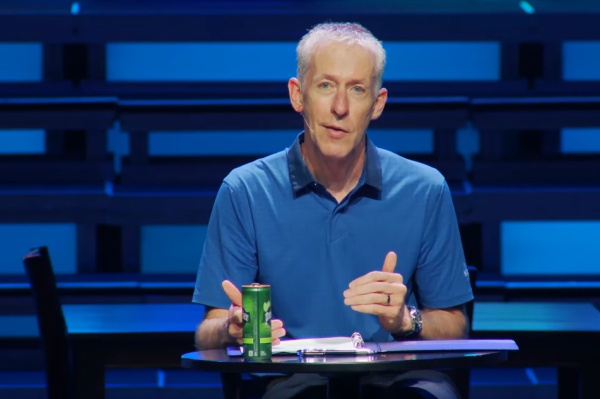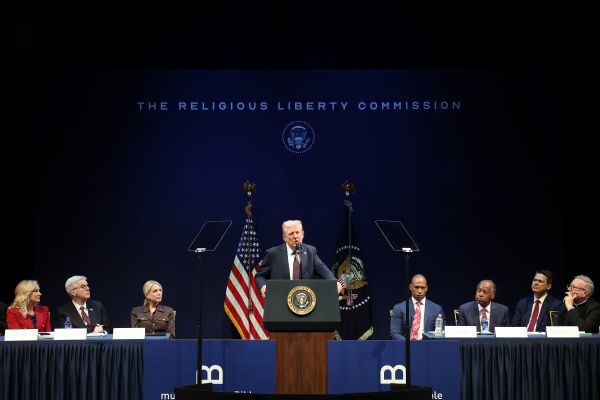Can anything ever replace the Gospel?

No ideology, philosophy, or religion has been able to supplant the Good News. The Gospel continues its perennial influence over humankind. “Heaven and earth will pass away,” said Jesus, “but my words will not pass away” (Mark 13:31). Even skeptics cannot help but experience the convictions of Jesus. What is indisputably true is that for the past 2,000 years whoever has accepted God’s grace has experienced a wonderful regeneration. You can fact-check this claim, and research the endless testimonies across the centuries, nations, cultures, and classes of people who have similarly experienced the Gospel’s promises: “If the Son sets you free, you will be free indeed” (John 8:36).
What exactly is the Good News? It’s not complicated at all. The Good News is that Jesus provides forgiveness of sins for free. This message continues to fulfill its promises and remains unassailable.
Whenever the Gospel is in conversation, people know what are the implications of its message. They take umbrage at being reminded of sin. The convictions are real. Jesus said that the Spirit “will convict the world concerning sin and righteousness and judgment” (John 16:8). So, attempts are made to circumvent the Gospel’s inescapable convictions. Myriad excuses have ensued: Maybe the Gospel was fabricated? Maybe the convictions are social constructs? Our collective conscience could have emerged from the evolutionary processes? Perhaps the dictates of reason give us all a sense of right from wrong? What about other religions? The maybes, perhaps, might of, could have, and what abouts, are all part of humanity’s escape mechanisms. In reality, nobody can escape the convictions of the Gospel.
What has been notable throughout history is how humanity has often sought to replace our Savior with surrogates. It’s not surprising. Jesus did say, “I have come in my Father’s name, and you do not receive me. If another comes in his own name, you will receive him” (John 5:43). The evaluations of the Gospel by public intellectuals, pundits and cultural icons have become more significant than the actual Good News. Natural explanations are far more welcomed because they allow people to remain self-centered. As John revealed, “the light has come into the world, and people loved darkness rather than the light” (1 John 3:19).
Now there are unbelievers who are decent, civil, mindful of others, and make contributions to society. Accordingly, many now believe that the Gospel is irrelevant and a stumbling block to progressive society. This is misinformation because the Gospel does not prevent people from pursuing careers and contributing to society. As Jesus encouraged, “But seek first the kingdom of God and his righteousness, and all these things will be added to you” (Matt. 6:33). The Gospel invites people to reconcile with God, and by His grace the human experience is completed.
I realize that some readers here disagree. But on what grounds? I have already written extensively and shown that reason and science do not falsify Christian faith. Deep inside, people choose to be contrarian in order to maintain what they believe is freedom to think and do as they wish. Humanity has taken God’s gift of life, His intellectual and creative gifts, its God-given free will, and audaciously used them to replace Him with humanistic thought. Humanity has taken all of God’s gifts and thrown out His rightful rule. This rebellion is the fundamental problem of humankind.
Yet God showed “his love for us in that while we were still sinners, Christ died for us” (Rom 5:8). Here everyone has heard the skeptic charge that Christ didn't have to die, because God could have forgiven sins without allowing such suffering. That perspective is also theologically misinformed and is another excuse to escape personal conviction.
Okay, fine, now let’s pretend that Jesus did not need to suffer and die for our sins. The skeptic now charges that God’s forgiveness is facile. It’s too easy and meaningless, with no real justification for the forgiveness of our transgressions. God should have come down Himself and die for our sins. That would have been a remarkable display of love, but He didn’t do that. You see, skepticism can always, and conveniently, produce an escape mechanism.
Anything that evades accountability to God is welcomed by the natural person. No human concoction of knowledge, however, has ever appeased the convictions of the inner person and provided forgiveness. Blaise Pascal famously said, “The heart has its reasons of which reason knows nothing.” Admitting to sin and receiving God’s grace continues to provide the most liberating experience.
We are soon approaching 2024, and people continue to search for peace and fulfillment. Artificial intelligence will probably make life more complicated because it’s precisely that, artificial. Some might even believe that AI can somehow find a way to replace the Gospel, but this expectation is another “escape mechanism.” Humanity will continue to experience inward convictions which can never be de-programmed.
The Spirit remains nearby. You are now inhaling, and exhaling, as your breath has been given to you by God. That is how close He will always remain. Anyone who calls upon the Lord Jesus for forgiveness will make friends with God, and nothing can ever be greater than that.
Marlon De Blasio is a cultural apologist, Christian writer and author of Discerning Culture. He lives in Toronto with his family. Follow him at MarlonDeBlasio@Twitter





















